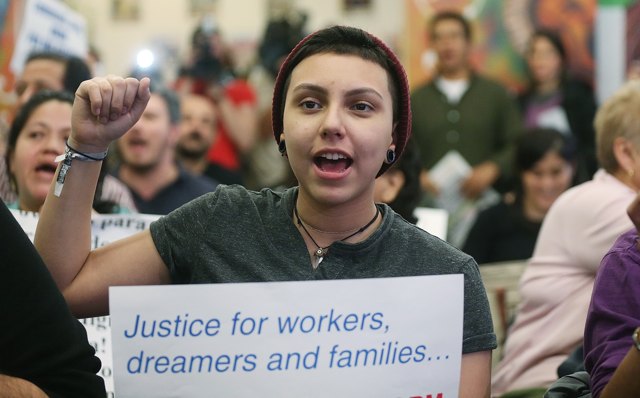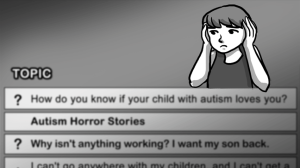Originally published on Colorlines and cross-posted here with their permission.

NEW YORK, NY – JANUARY 29: Undocumented immigrant Katherine Taberes, originally from Colombia, cheers during a watch party of President Barack Obama’s speech on immigration on January 29, 2013 in New York City. Obama called for immigration reform and a “pathway to citizenship” for the nation’s 11 million undocumented immigrants. (Photo by Mario Tama/Getty Images)
President Obama and Senate negotiators kicked off the national immigration reform process in late January, but the contours of the would-be bill are already in sight.
With Obama’s proposals only a hazy shade more inclusive than the Senate’s plan, and with the inevitable back room dealing and negotiating already underway, is there any room for everyday people who aren’t lobbyists and professional activists to insert themselves?
Is there political space for the policy framework that’s been proposed to be improved upon? Does your lone voice matter?
I spoke with activists, experts, community leaders and advocates who said: yes, yes and yes.
Read on for six concrete things you can do to help make sure what ends up happening on immigration this year is as equitable and just as can be.
1) Get smart.
So you know the U.S. immigration system plainly sucks and immigration enforcement is a devastating regime, but you couldn’t tell 287(g) from H-1B and are mystified by oft-used jargon like “border security” and “amnesty.” No problem.
You can get educated by reading a diverse group of perspectives. (Our own immigration coverage is a good place to start!) But the moment to do so is now; the country is as close as it’s ever been to overhauling its immigration laws.
“It’s easy to just read the New York Times and President Obama and think, ‘I guess everything is done,’” says Thanu Yakupitiyage, a communications associate with the New York Immigration Coalition, so beware the platitudes of the president and the mellifluous Spanish of Florida Sen. Marco Rubio.
The fact is immigration reform promises to be a bumpy ride. “If you’re not already tapped into organizing or immigrant movement-type activism, keep yourself informed. Read multiple sources and go to critical media,” she added.
Taking responsibility for your personal education on an issue as critical and complex as immigration can be a political act in and of itself.
2) Figure out your personal political thresholds.
Capitol Hill can be an ugly place, where cynical political calculus and ideology easily trump all else, including sense.
Even in well-meaning hands, questions like exactly how much immigration enforcement will be accepted in exchange for a limited legalization program, which could preclude gay couples and others, can force difficult choices between justice and compromise, said Victor Narro, project director at the UCLA Labor Center.
The eternal question for immigration reform advocates has always been: Is something better than nothing? Is it better to take the politically feasible or hold onto one’s integrity to demand something more ideologically pure?
Decide how much you can stomach, so you can push as hard as you can for reform that doesn’t make you retch.
3) Find out where your local elected officials stand on these issues so you can push them.
Immigration reform advocates agreed: the success of the coming fight will depend on how well people on the ground can amplify their voices to be heard on the national stage, and one of those entry points is via good old fashioned local civic engagement.
“If you listen to the president and the ‘Gang of Eight’ [Senate negotiators], what they’re saying is not very different at all from what has been said in the past,” says Christian Ramirez, the national coordinator for the American Friends Service Committee in San Diego. “But the conversation has certainly changed in communities.”
Many fragile Democrats and Republicans still scarred by the tea party’s ascendance during the 2010 midterms will be less likely to update their approaches to immigration to keep pace with the clearly changing demographics of the country.
But in historically conservative places like San Diego, which elected its first Democratic mayor in November and just seated its first majority Democratic city council due in part to the steady browning of the city, “People need to understand first, that they voted, and their vote really did matter,” Ramirez says. “But the process of exercising our right to vote did not end in November. Now is the time to vote with our feet.”
4) Connect with your local immigrant rights group.
The marches are coming. April 10 has been identified as a national day of action, and now is the time to tap into community organizations, sign up for email lists, and make sure you get up to date information about where to show up and which lawmakers to best direct your phone calls and letter-writing efforts.
5) Learn your own history with migration.
It was none other than President Obama himself who reminded the country this week that, “unless you’re one of the first Americans, a Native American, you came from someplace else. Somebody brought you.”
While not everyone came to the country of their own will, reminding ourselves of our individual and collective histories can be instructive, says Rev. Kelvin Sauls, the pastor at the Holman United Methodist Church in Los Angeles.
“I would tell people to ground themselves so deep in their own story that they are willing to listen to the stories of someone else,” says Sauls, who co-founded the Black Alliance for Just Immigration. It’s not just about having compassion for other people’s suffering.
It’s about understanding how the forces of systematic oppression and exclusion have trained their eye on new targets time and again. Sauls, who was raised in South Africa, says his experience with apartheid made it easy for him to speak out against SB 1070 in Arizona.
“It was only when I was willing to struggle with the pain of my own experience with apartheid that I was able to connect with Jim Crow in America, and connect it with the Sonoran desert in Arizona and refugees from Cambodia,” Sauls says. “And so I realized, oh my gosh, my experience of pain is not isolated to just me.”
“Everybody is sitting next to their own pool of tears, and the longer you deny your own pool, the longer it will justify you to continue to engage in repackaging the violation of others and the recycling of oppression,” Sauls said.
6) If you’re undocumented, consider telling your story.
There’s power and a certain safety in coming out and declaring your status, says Erika Andiola, an immigrant rights activist who just last month defended her mother and older brother from deportation after a raid on her Arizona home by mobilizing her contacts in the immigrant rights movement.
Coming out serves several purposes, Andiola argues. One is that deportation defense work relies very much on publicity; activists shame immigration officials into following their own policies by highlighting the hypocrisy of their stated policies and the cruelty of their actual practices.
But it also serves a broader political purpose. By telling one’s own story, an issue which may have once been an abstraction is quickly connected to a real face, and a real family. It’s easy to call for the deportation of unauthorized immigrants, but harder when one of them turns out to be your next-door neighbor.
And at least until federal reform arrives, those who want to fight the enforcement machine that is ravaging immigrant communities must defend people on an individual, case by case basis.
“I’m not necessarily telling people to go talk to national media, but at least communicate with your neighbors, communicate with your church if you go to one, let them know what situation you are in,” Andiola says. “But when you organize around your community, and when your community knows you and understands what you’re going through, it can really protect you.”
Julianne Hing is a reporter and blogger for Colorlines.com covering immigration, education, criminal justice, and occasionally fashion and pop culture. In 2009, Julianne was the recipient of USC Annenberg’s Institute for Justice and Journalism fellowship, which funded a reporting project on the impacts of criminal deportation on immigrant families. Julianne’s writing has appeared on AlterNet, Truthout, Hyphen Magazine’s blog, The American Prospect’s blog TAPPED and Ta-Nehisi Coates’ blog at The Atlantic, Racialicious, The Root and New America Media. Julianne tweets at @juliannehing.
Search our 3000+ articles!
Read our articles about:
Our online racial justice training
Used by hundreds of universities, non-profits, and businesses.
Click to learn more




















